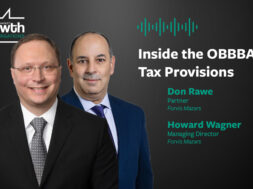Middle-Market Public Policy Roundup
The FTC calls for scrutiny on private equity roll-ups in health care, the SBA releases data on PPP loan recipients, and other events in Washington around the Independence Day break.

This article was updated on July 9.
In this week’s roundup, we look at the Federal Trade Commission, which is calling for increased scrutiny on private equity roll-ups in the health care industry. We also provide a summary of the Small Business Administration’s release of data on Paycheck Protection Program loan recipients.
The roundup took a brief respite during the Association for Corporate Growth’s Membership Summit on June 23-25 and then later in observance of Independence Day. The following includes a recap of some of the other events that happened in Washington during the hiatus.
FTC Commissioner Wants to Scrutinize Health Care M&A
In a note submitted with an annual antitrust report to Congress, the head of the Federal Trade Commission expressed concern over private equity roll-ups in the health care industry, and called for the agency to halt some acquisition strategies.
FTC Commissioner Rohit Chopra said he was concerned over private equity’s buy-and-build activities that fall below the threshold for federal antitrust reporting requirements.
“M&A activity in health care is among the highest of any sector in the U.S. economy,” he said in a letter submitted Wednesday with the agency’s annual Hart-Scott-Rodino antitrust report to Congress. “Private equity roll-ups occupy a growing proportion of this activity.”
He noted that many of the deals involving insurance brokerages, physician practices, anesthesiology and emergency medicine groups fall below federal antitrust reporting requirements that oblige firms to disclose transactions over $94 million.
Chopra said he is particularly concerned about private equity activity in opioid treatment centers, hospice care and air ambulance services over fears that roll-ups could lead to a loss of competition.
He said he was also concerned that unreported M&A activity could contribute to increases in surprise medical billing by out-of-network physicians—and added that the FTC should halt some acquisitions.
Chopra said the agency should also order information on mergers in the health care space that fall below reporting requirements, and scrutinize filings by private equity firms to gain insight on their future acquisitions that may be nonreportable.
He also said the FTC will need to consider whether there should be changes to antitrust law or to the way regulations are implemented that would help the agency detect harmful roll-up activity.
Advocates for private equity investment in America health care argue that it plays a positive role in improving services. In a recent article posted to its website, investment firm Adams Street Partners outlined the asset class’s contributions to the industry.
“Private equity has been instrumental in funding new and highly innovative business models, making existing infrastructure more efficient, and investing in technology-enabled healthcare solutions to decrease costs and increase efficiency,” the authors wrote.
An EY survey published last October echoed those claims.
The firm spoke with and surveyed more than 80 health care company founders and executives whose physician practice management companies had received private equity funding. Ninety percent of respondents reported a positive experience with private equity.
The EY report’s authors went on to write, “Not only is PE perceived to have a beneficial overall impact on health care businesses, it is also considered to positively influence the focus on quality and clinical services.”
SBA and Treasury Announce Release of Paycheck Protection Program Loan Data
The Small Business Administration and Treasury Department this week released data for the more than 4.8 million loans made under the Paycheck Protection Program.
In a statement published on Monday, Treasury Secretary Steven Mnuchin said 27% of the funding reached low- and moderate-income communities, and the average loan size was about $100,000.
“The program is serving the smallest of businesses,” he said.
The published data includes business names, addresses, NAICS codes, zip codes, business type, demographic data, non-profit information, name of lender, jobs supported, and loan amounts ranging from $150,000 to $10 million.
These categories account for nearly 75% of the loan dollars approved. For all loans below $150,000, SBA is withholding business names and addresses.
The data release also includes overall statistics regarding dollars lent per state, loan amounts, top lenders and distribution by industry.
In addition, the data provides information regarding the sizes of participating lenders and participation by community development financial institutions, minority depository institutions, Farm Credit System institutions, fintechs and other nonbanks, and other types of lenders.
It also contains data showing the reach of the program in underserved communities, rural communities, historically underutilized business zones (HUBZones), and participation by religious, grantmaking, civil, professional and other similar organizations.
View the data here.
Financial Regulators Modify Volcker Rule
Five federal regulatory agencies finalized a rule modifying the Volcker Rule’s prohibition on banking entities investing in or sponsoring hedge funds or private equity funds—known as covered funds.
The final rule, passed June 25 by five federal financial regulators, including the Federal Reserve and the Securities and Exchange Commission, is similar to the proposed rule from January and will go into effect Oct. 1, the agencies said in a statement.
The Volcker Rule generally prohibits banking entities from engaging in proprietary trading and from acquiring or retaining ownership interests in, sponsoring or having certain relationships with a hedge fund or private equity fund.
USMCA Goes into Effect
The United States-Mexico-Canada Agreement, or USMCA, entered into force on July 1, replacing the North American Free Trade Agreement, which regulated trade on the continent for more than two decades.
The White House and U.S. Trade Representative said the new trade pact will work toward rebalancing trade between the U.S. and its neighbors and lead to significant economic and job growth.
“The USMCA contains significant improvements and modernized approaches that will deliver more jobs, stronger worker protections, expanded market access, and greater opportunities to trade for companies large and small,” U.S. Trade Representative Robert Lighthizer said in a statement.
Recovery Conditional on Containing Virus, Fed Chair Says
Economic recovery in the U.S. will depend in large part on the country’s success in containing the COVID-19 virus, Federal Reserve Chairman Jerome Powell told lawmakers during a hearing held before the House Committee on Financial Services on June 30.
“A full recovery is unlikely until people are confident that it is safe to reengage in a broad range of activities,” Powell said in his opening statement.
The Fed chairman added that future progress will also depend on the policy actions taken at all levels of government to provide relief and to support the recovery for as long as needed in order to avoid long-term damage done by the coronavirus outbreak.
Treasury Secretary Steven Mnuchin also participated in the hearing and said the Treasury anticipates any additional relief would target industries that have been especially hard-hit by the pandemic, with a focus on putting unemployed Americans back to work.

Benjamin Glick is Middle Market Growth’s associate editor.


